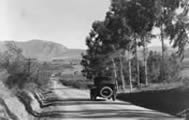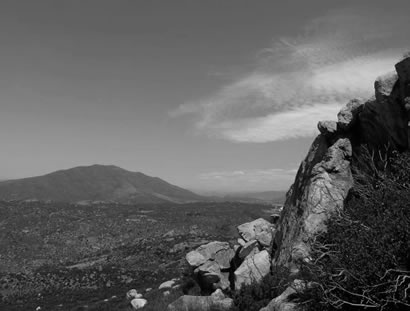|
Viejas Valley. Source Unknown.
by Albert Simonson
Advertising pays. There is proof positive of this fact in the amazing whirlwind courtship of Cockney Bill Williams. This is a story about the mother of all personal ads, and the power to change lives.
Cockney Bill did not have an awful lot going for him in grimy old London towne. So, like many other fifteen-year-olds, he forsook Old Blighty and signed on as cabin boy at the drab dockyards of home. Billowing sails, seaward sailing, held promise of something better beyond the seas.
By the time the storm-tossed merchantman hove to in San Diego Bay, Cockney Bill had his sea legs and salt in his teeth. He had just come from the Sandwich Islands, where South Sea Islanders calling themselves Kanakas mingled and drank with sailors from all the seas in Honolulu's harbor. In 1836, the pueblo of San Diego looked like a place where a young man could make his mark.
Cockney Bill stepped ashore and landed a job at Captain Henry Fitch’s La Playa hide house. There he cured and stored hides for the coming of wooden sailing vessels like Boston’s good ship Alert, or the Ayacucho, loading for Peru. Kanakas lived on the beach in the “Kanaka Hotel,” a large abandoned Russian bread-oven furnished with Oahu mats. The Kanakas liked to party, and Cockney Bill drank along with gusto.
Hides were prepared all up and down the coast, at San Pedro and Santa Barbara - wherever mission cattle ranged on the grasslands of a beautiful, unfenced California. But at the bay side of San Diego’s Point Loma, you could moor a vessel within a cable’s length of a calm, smooth, hard beach, and not get the hides wet in surf like at San Juan Capistrano and elsewhere.
The beach was a jolly place when trading ships rounded the point. Sailors rowed customers aboard, where señoras indulged their caprices of Chinese silks and Lowell calicoes, as caballeros attended their needs for iron shod English cartwheels and casks of Madera wine. There were even Chinese fireworks for fiestas and mischief.
Across the bay above the mud flats were some three dozen dust-colored adobe houses and a grog shop where a sailor could sample the local rotgut for a Spanish real (one bit or 12 1/2 cents). With luck, he might get to see a bull-and-bear fight in the plaza, or join in the dance at a fandango.
Eventually, Cockney Bill was put in charge of Fitch’s hide house, while the captain sailed to the Sandwich Islands. But before long, Bill followed the production stream of cowhides, the famous “California Banknotes,” to their upstream sources. He became Indian subagent at Mission San Luis Rey de Francia and also superintendent at Rancho Santa Ysabel, on the road to Warner’s and the Colorado River.
When the “Army of the West,” under General Kearny (for whom Kearny Mesa is named) invaded California in 1846, it was Cockney Bill who cooked them a fine dinner of mutton, grapes, and tortillas. But, it was recorded, “His wine was abominable.”
One officer praised his “distinguished hospitality;” another commented that he “made good use of his keys and shone in his true colors as Sailor Bill. . ., with the sailor visible in all his acts.” Yet another more dourly called him a “lying, drunken, talking Englishman, goodhearted, but little to be believed.”
Cockney Bill, a.k.a. Sailor Bill, was also known as Major Bill or to Indians as Señor Beel. The Indians were very fond of him.
Cockney Bill was engaged by the army to lead them to the fateful Battle of San Pascual. Bill was a bit under the weather next day, and, besides, the weather was wet and foggy in the mountains. He then “found himself very much in the humor for chasing wild horses, and a band of mares presenting themselves, Bill took after them, got thrown, and declared he would go no further.”
The General ordered dragoons to remount him, handed him his skin of wine, and ordered him to lead them to San Pascual. Cockney Bill, in his diminished state, dutifully led the army through mist and rain down a wrong trail.
The army was severely beaten at the ensuing battle. Maybe it was the wet gunpowder. Maybe it was the abominable wine. Maybe it somehow wasn’t Bill’s fault.
Up Santa Ysabel Creek from the present church of Santa Ysabel, the “Kanaka Trail” leads to a beautiful valley where the mountain town of Julian has its water wells. The creek flows year ‘round, even in drought years. That is where Cockney Bill established his “Rancho Volcan de Santa Ysabel. It was a fertile valley, formerly mission rodeo grounds, and Bill used it to pasture army horses. He shared his home with some Indians and a bunch of footloose mountain men. There were, alas, no women.
By 1853, though, Bill moved to Viejas Valley and built a two-story adobe just east of present Viejas Casino. Things started looking up. The new rancho became the prime grain supplier to the army, and soon the “Jackass Mail,” the first transcontinental mail line, presented the opportunity for a stage stop. The only thing missing in Bill’s life was a wife and kids.
It wasn’t easy to meet ladies. Most spoke Spanish and Bill had learned to speak Spanish, but with a dreadful cockney accent. He came to town often, even helped out at the “Old Mission Theater.” But he remained a lonely mountain man. How could he ever find the joys of love and family?
The September 5, 1857 edition of the San Diego Herald ran a very unusual ad. Boldface type proclaimed, “WIFE WANTED.” Cockney Bill modestly described his own appearance as “passable” and his financial status as “unexceptional.” Still, he expected to be able to support a family if the wife were “free from those extravagant notions and airs so peculiar to a large portion of females in this part of the country.” Some things never change!
There were exacting specifications. She needed to be “not less than 25 nor over 32 years of age - of fair personal appearance and education and of sound healthy body.”
He added, “If of a prolific family, so much the better.” Clearly, this practical fellow needed kids to help work the ranch. Pledging his sincerity, he awaited a response from someone in whom “the graces of form to the features impart . . . the sweetness that lives in an innocent heart.”
Within a month, this lonely mountain man was wed to San Diego‘s merriest of widows, Doña Ramona Machado de Curley, once described as the “admired of all admirers, the center of attraction to a gay coterie of officers” at the San Diego Yacht Club’s 1852 ball.
Having thus established the efficacy of personal ads, perhaps the first such ad in San Diego, the Herald trumpeted the felicitous union as proof of its advertising power.
To boot, Ramona already had five children from her first husband. He, together with an Indian, had drowned while otter hunting off North Island. There would be many hands to work the big new rancho.
So - does advertising bring results? You bet it does! Cockney Bill proved it, once and for all.
|




